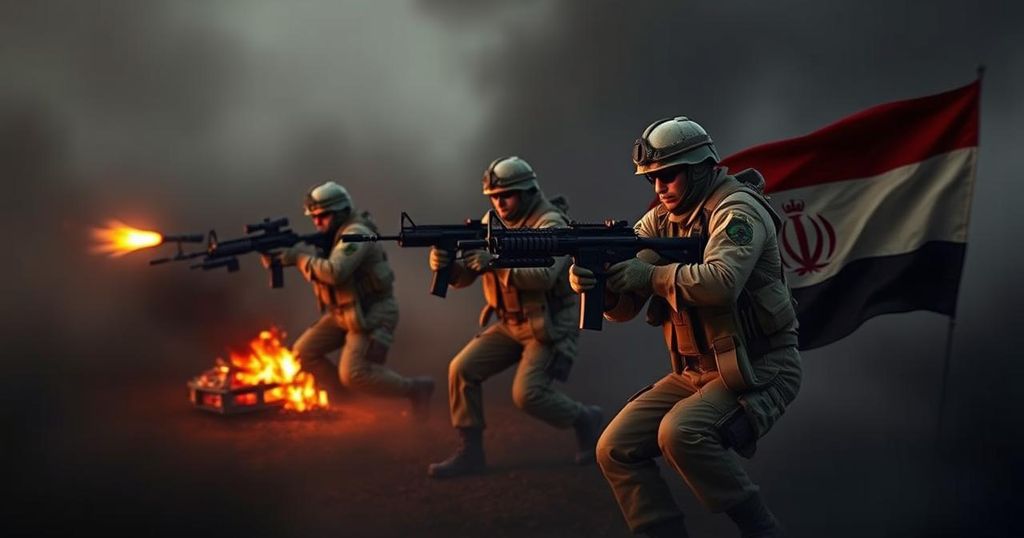Iran-Linked Militias Escalate Attacks on Israel Amid Regional Turmoil

Over the past two and a half weeks, Iranian-linked militias in Iraq executed approximately 40 attacks on Israel, reflecting a significant escalation in a proxy battle driven by regional tensions. Following the killing of Hezbollah leader Hassan Nasrallah by Israeli airstrikes, Iran has sought to mobilize its junior militias as a countermeasure against ongoing Israeli offensives, leading to a surge in missile and drone activities against its arch-foe. This situation highlights the intricate alliances and military strategies at play, as well as the risks of further escalation in an already volatile region.
Iran-affiliated militias in Iraq have intensified their attacks against Israel, carrying out approximately 40 assaults with missiles, drones, and rockets in a span of two and a half weeks. This surge in hostilities coincides notably with the death of Hezbollah leader Hassan Nasrallah due to an Israeli airstrike on September 27. Since the onset of the Gaza conflict in October, these attacks have escalated, reflecting a broader proxy confrontation across the Middle East. Given the diminished capabilities of Hamas and Hezbollah under Israeli military pressure, Iran has redirected its resources toward lesser factions within its network to inflict damage on Israel. Michael Knights from the Washington Institute remarked, “The number of missiles and drones being fired from Iraq [at Israel] has gone through the roof. They’ve moved into a higher gear to demonstrate their support for Hezbollah.” The increasing militaristic responses from Iraq illustrate Iran’s ongoing strategy to galvanize its militias in the region. Although these Iraqi proxies may lack the sophistication of Hezbollah, they are eager to enhance their standing among Iran-supported factions. Furthermore, with ongoing tensions in Syria where Iranian-backed groups also operate, analysts predict potential escalations in Israeli defensive actions against these proxies. Recent military operations by Israel further signify increased hostilities, targeting facilities in Syria linked to Iranian interests, including airstrikes on sites believed to assist Hezbollah. This pattern of aggression raises concerns as these events unfold, particularly in light of prior incidents, such as the detonation of Hezbollah’s communication devices, which have reportedly led to casualties across various locations. Moreover, the collaboration among Iranian affiliates enhances their operational capacities, which could lead to a more unified front against Israeli aggressive actions. Daniel Hagari of the Israeli military stated that they are closely monitoring developments from Iraq, ensuring that they will “do whatever is necessary to deal with the situation.” The dynamics of these conflicts in Iraq and Syria—for many, neglected—point to an increasingly complex battlefield, as Iran engages its broader network to counter Israeli offensive operations.
The ongoing conflicts in Iraq and Syria are characterized by a complex interplay of militant groups supported by Iran, significantly changing the operational landscape following the eruption of violence in Gaza in October. Iranian support for these proxy factions has evolved throughout the decades, especially following decisive blows to prominent groups like Hamas and Hezbollah who are facing increased Israeli military pressure. The tactical use of missile and drone attacks from Iraq highlights a strategic pivot by Iran to utilize less prominent militias in its ongoing resistance against Israel, which has historically targeted Iranian assets prevalent in Syria. The situation has intensified with increased Israeli military strikes aimed at destabilizing Iranian-backed operations in the region, recognizing these as potential threats to its national security. This intricate web of alliances and hostilities underscores the heightened tension within the Middle Eastern geopolitical arena.
The intensification of Iranian-linked militia attacks from Iraq against Israel marks a significant escalation in the proxy warfare that has been unfolding across the Middle East. This increase in hostilities ties directly to the current precarious military positions of key Iranian allies, particularly in response to Israeli actions against these groups. As Iran pivots to lesser-known factions for support while simultaneously coordinating operations within its broader network, the risk of further escalation grows, potentially involving more direct confrontations with Israeli forces. The complexity and rapid developments within the region necessitate closer scrutiny and informed responses from international stakeholders.
Original Source: www.theguardian.com








